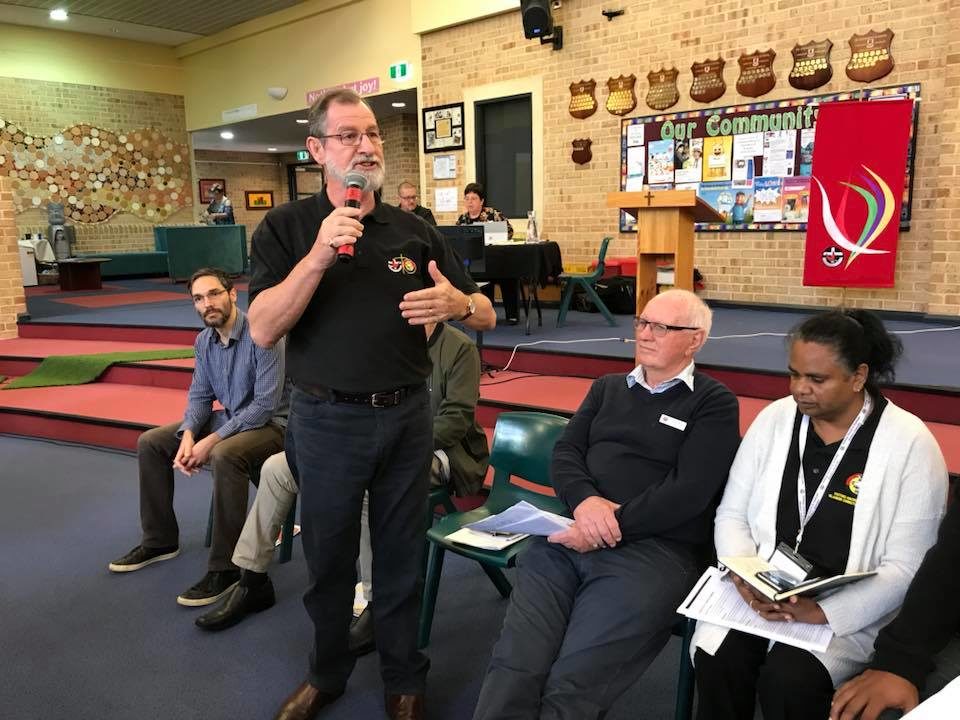
Dr Richard Smith, from the Uniting Church WA Covenanting Commission, offered this reflection after a workshop on Sovereignty and Treaty led by UCA leaders of the Noongar people at the Presbytery of WA Meeting.
Below his article is a question for reflection and some thoughts shared within the Circle.
The Story was originally published in Revive Magazine.
Stuart McMillan, Assembly Consultant Covenanting and Ex President of the Uniting Church in Australia, shared the church’s prophetic vision of Sovereignty and Treaty in a workshop at the October Presbytery of WA Meeting.
My imagination came alive when Rev Robert Jetta, Chair of the Uniting Church WA Covenanting Commission, shared the First Peoples’ belief, “we are in the land and the land is in us.”
This is a belief forged by their survival for some 60 000 years, including a major ice age in which lakes dried up, forests disappeared, deserts expanded, animals went extinct and vast swathes of the Australian land mass became uninhabitable. As the ice caps expanded, sea level dropped by 120m, enabling the local First Peoples to move to Rottnest Island, but they left as the sea level rose to its present level.
What First Peoples had learnt is what Ecclesiastes had concluded and we are still learning: “Stand in awe of nature and do what it requires of you, for this is the whole duty of humankind. For everything we do nature will bring to judgement, even everything hidden, whether it be good or evil.” (Translation from Such is Life: A close encounter with Ecclesiastes, by Lloyd Geering.)
First Peoples survived by discovering the natural law where there’s no mercy – only law and grace. If you don’t understand that law and you don’t abide by that law, you suffer the consequences. By obeying the natural law, the First People earned their Sovereignty, which in the Uluru Statement from the Heart is described as:
“a spiritual notion: the ancestral tie between the land, or ‘mother nature’, and the … peoples who were born therefrom, remain attached thereto, and must one day return thither to be united with our ancestors. This link is the basis of the ownership of the soil, or better, of sovereignty which has never been ceded or extinguished, and co-exists with the sovereignty of the Crown.”
In just 230 years the Second Peoples – whose governments claim exclusive sovereignty – have, by ignoring this same natural law, brought upon us the existential crisis of climate chaos by promoting an economy of colossal waste, pollution and resource consumption believing it could continue indefinitely without consequences. National recognition by Treaty of the Sovereignty of First Peoples would be a prophetic moment of addressing this climatic chaos, a moment the church was born for.
Richard Smith
For Discussion:
What is your response to this reflection?
Some responses shared in the Facebook Group
- Robert’s reflections are insightful, spiritual and should stimulate and prod our Western consciences.
- We can learn much from our First Peoples. From their stories, we can learn the importance of caring for country, of honouring the land in which we walk and live. Something that has been so important from so long ago; something that is so important in our own time, as we respond to the challenge of climate change, with global issues such as rising sea levels, widespread deforestation, the destruction of species and a deliberate blindness to the perils of continuing to burn fossil fuels with impunity; and the pressing personal demands of environmental responsibility and sustainable lifestyle.
And if the land is the people and the people are the land, then our care for one another and care for the land go together inextricably. - I am, of course, committed to this path, but I’m conscious that we have several tasks before us:
1. educate and mobilise the members of the UCA (this will take two different strategies, the first being about reading past, present and future society and culture, the second being about personalising the issue for people)
2. To be heard in the wider society, we need to be much more effective in making this a priority in interfaith, ecumenical and para church conversations
3. Different organisations and institutions in Australian society need to be approached and mobilised in support.
Representations to parliamentarians are only effective if we bring enough ‘community’ with us... - A plan of action?
- I think we need to use the circle conversations to prepare initial thoughts for planning
Add your thoughts either on Facebook or by email: circle@nat.uca.org.au
